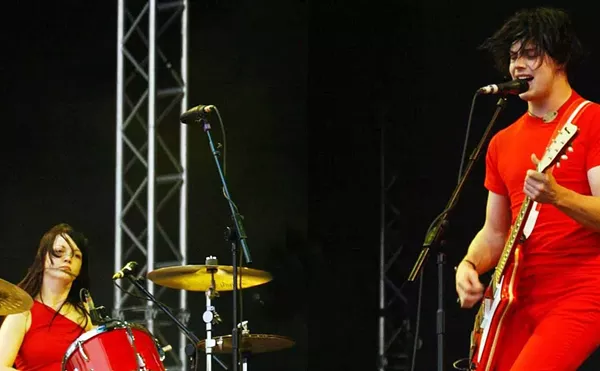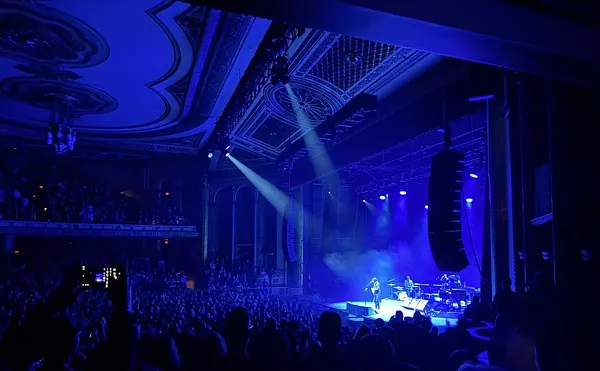Gestalt-country
Songwriters collaborate to become greater than the sum of their parts

Audio By Carbonatix
[
{
"name": "GPT - Leaderboard - Inline - Content",
"component": "35519556",
"insertPoint": "5th",
"startingPoint": "3",
"requiredCountToDisplay": "3",
"maxInsertions": 100,
"adList": [
{
"adPreset": "LeaderboardInline"
}
]
}
]
The Inside Outlaws was formed in 2005 by Don "Doop" Duprie and Ty Stone. According to Duprie, "The original vision was to get a group of songwriters and musicians together to make good music and really focus on writing great songs."
Since that time, the collective has morphed into a group of musicians who can go out on their own and create music under their own name, but also can come back whenever they want to their artistic home and collaborate with their fellow Inside Outlaws.
In addition to Duprie and Stone, the group of alt-country and Americana musicians now includes Pat V, Katie Grace, Alison Lewis and Matt Dmits.
Meanwhile, three of the best records out of the Ann Arbor-Ypsilanti area the last couple years came from a similarly tight-knit group of friends and songwriters: Chris Bathgate's Salt Year from 2011, Matt Jones & the Reconstructions' Half Poison, Half Pure from earlier this year and Misty Lyn Bergeron & the Big Beautiful's False Honey which just came out last week.
You could give Chris Bathgate, Misty Lyn Bergeron and Matt Jones just an acoustic guitar and they could captivate an entire hall with their timeless songwriting. But there the similarity ends — each of their bands has a singular sound (and an all-star lineup). Chris Bathgate layers his songs with guitar loops, fiddle and heavy percussion. Lyn has a classic Americana sound with guitar badass Ryan Gimpert (of Will Sessions) on guitar and pedal steel with Ann Arbor's scene linchpin-producer Jim Roll on bass. Matt Jones' band features a chamber pop approach with the spirited cello arrangements of Colette Alexander along with Lyn's stunning harmony vocals.
And they all support one another on and off stage. Jones is Lyn's permanent drummer and frequently drums with Bathgate. When they're not playing their own songs they're frequently extolling the brilliance of their friends from the stage.
We spoke to Duprie, Lewis and Grace of the Inside Outlaws to find out what makes this dusty ensemble tick, then we sat down and talked with Jones and Bergeron about their friendship and the scene it inspired.
Inside Outlaws
Metro Times: What do the members of the Inside Outlaws have in common?
Don "Doop" Duprie: I think that we are all very much into songwriting. We take pride in it. We all have the common goal to write the best songs we can. We're not just looking to rhyme a bunch of shit and run around acting goofy. We want to write a song that can touch somebody. That's the stuff I always dug growing up and the stuff I still dig now: the stuff that hits you in the heart. We don't want to half-ass anything.
MT: The Inside Outlaws are based Downriver and in the city of Detroit itself. Does your location affect your music?
Duprie: I think we're a little grittier and gloomier because of where we are. It comes out. I'm from River Rouge, which is a downtrodden area, so you see the darker side of life. That definitely shines through in the music. I'm just talking about what I see — just doing social commentary.
Lewis: I've been back in Detroit for about five years. I was gone on and off for about 10 years, but I'm from Detroit. Now, I live in Corktown. My location definitely affects my music. I think that I write visually based songs. On my last record, there's a song that is literally about the people who lived across the street. I sat on my porch, watched and wrote. Also, Detroit is home.
Grace: I was born and raised in Detroit with good Midwestern qualities. Hardworking, down to earth, and calling things how you see 'em comes through in my songwriting, as well as all the Inside Outlaw collective. It gives us a no-bullshit approach to songwriting. Life ain't about rainbows and butterflies all the time.
MT: What are the benefits of collective songwriting over going it alone?
Lewis: I have spent most of my career working by myself. I think [working collectively] allows you to get out of yourself a little bit. That's nice to do, when you get tired of your own stuff. It can be helpful to get ideas from a totally different perspective. Sometimes when we get together, the song can go in a completely different direction, which is really cool.
Duprie: I enjoy working with people, whether I'm working on a car or painting something, anything. I like the camaraderie, and it makes things a lot easier. With your writing, you're getting that second set of eyes and ears on everything. It helps. You want it to affect everybody, all different groups of people. When you bring somebody else in, you're improving your chances. Sometimes you might just be stuck on something, and they might have that one line that works perfectly for you.
MT: How does an outsider become an Inside Outlaw? Is there an initiation test?
Duprie: Usually what happens is we have listening nights, and I'm always on the prowl for somebody who will stir me inside. If we see somebody and it seems like they'd fit with us, that's when we start writing things. Sometimes it can be weird because people call who want to get involved, but you can't just get into it like that. You have to come out and spend some time in the writer's nights. If you've got it, you've got it.
MT: Is it a hindrance to be labeled an acoustic artist, when you guys are well capable of rocking out too?
Duprie: Sometimes it is. I know that I can get up on stage and play. It doesn't bother me that much. Everybody's sick of doing three sets in a sports bar where nobody's listening to you. Now we're going out and trying these listening rooms. I love that. You can do what you want. You don't have to worry about having a set list. You can just get out your guitar and play.
Grace: I don't feel pigeonholed one bit. The Inside Outlaw collective has a wide range of talented players. It's true that I got my start in the bluegrass circuit. But as I am developing my own style, I branch out to a wider range of songs. Now I put four chords in my songs, instead of three. [laughs]
MT: Doop, both you and Matt Jones are huge Springsteen fans. What is it about the Boss that grabs you?
Duprie: It's just the truth. It's the closest thing to the truth that you can get. Coming from a working-class family, his music spoke to me since I was little. I remember older people playing his stuff when I was a kid and I still kind of got it. It's pretty cool when you can write something and it transcends like that to everybody. It gives me something to shoot for when I'm writing. You want to make sure that when you write, you're living up to what that dude's doing.
MT: What are the best dive bars and other assorted venues around town for you guys?
Duprie: We always play our night at the Corktown Tavern. We do a lot of stuff at the Comet Bar. We've got the Park Bar. Jerry, the owner, has been a huge supporter of what we've been doing since Day One. He's thrown money at people and done so much great shit for us. He tries to help us out.
Lewis: We do our thing at the Corktown Tavern, and those are the most fun. You're among songwriters who understand what you're doing.
The Ann Arbor-
Ypsilanti Collective
MT: Musically, what do you all have in common?
Jones: We all walk the same. Kind of a lumberjack-gangsta limp. Mostly it's due to a plethora of back problems attributed to our day jobs, and the heaviness of our collective hearts. That's not musical though. Musically, we all kind of sprang from the same musical sinkhole, and I mean sinkhole in the best way possible. Misty had Kelly Joe Phelps, Bathgate had Richard Buckner, I had Misty and Bathgate. We were all a bunch of folkies in the beginning who would have been playing metal if we'd known how to assemble and manage a band.
Lyn: A love for many different kinds of music. I think we could all surprise you with what we listen to the most. Obviously, you know I love metal, but I also love bands like Phoenix and Coconut Records. I think I may listen to my own genre the least of them all, actually. Also, an appreciation for the love and support this community shows for its musicians.
MT: How does being based in the Ann Arbor-Ypsi area influence your music?
Jones: I have honestly never known how to answer the geographic question. I don't know if it has any influence at all. I look at the bands around me for guidance in terms of how they go about being a musician, their dedication level. But I think that is just support, outside of what we actually play. I have never been out on the scene much, in terms of gleaning musical ideas from others. I would glean free whiskeys off people all the time, but the music always came from my own head, and not the town around me. But then again, sometimes I'll debut a new song to someone and they will be like, "Wow, that's my favorite Misty Lyn-Chris Bathgate song."
Lyn: I can't say that it does directly. Perhaps a healthy competition ... or at least increased motivation when you see others succeed.
MT: What are the benefits of collaborating with one another?
Jones: How much more beneficial can collaborating be when you are doing it with two of your best friends? Nothing judgey, you can laugh at someone else's part if you want, you can tell someone to take their idea and fuck off. Bathgate and Misty have both laughed at my ideas from time to time. There is a song I have a recording of ... a very old one called "Springtime in Cuba." It's one of the first songs I ever wrote. It is absolute crap. I sing in Spanish on it. I have never been to Cuba. I don't know anyone who has ever been to Cuba. I have no idea what spring is like in Cuba. But I wrote this song like 10 years ago. I played the shit out of it. Supportive friends are real nice, but only those who can tell you when you just might want to rethink that seven-minute epic about how you saw the whole world in a leaf that you found right after you shaved your mustache off or whatever.
Lyn: Again, the motivation that comes from each of us moving forward in any way. We lift each other up. So far it seems if any one of us is down and feeling a little lost, we can look at our friends and see that it's only a phase and fruitful times will come back round eventually.
MT: Is it a hindrance to be labeled an acoustic artist when you guys can rock out too?
Jones: I'm just glad I have the ability to rock it out. I don't care what kind of label I get really. On the right (or wrong) day, I might show up for an Ark gig with an explorer and a Marshall stack and shave the ears off the fleece-and-khaki crowd. You can't get frustrated about labels. There's a million, and you don't get to pick, so fuck it. Bathgate, though: He hasn't played an acoustic guitar in like seven years. And Misty: she has been picking up the electric more and more these days ... in our newish band, Communicorn, featuring Misty on electric and Greg McIntosh on bass and vocals. It's pretty damn cute, trying to teach Misty power chords and palm-muting.
Misty: It can be a bummer, but so far I feel like we've all been given the opportunity to play with bands that aren't necessarily in our genre. I wish it happened more, but it's good that it does occasionally happen. I love playing on bills that span genres. And we all tend to rock a lot more than our recordings, so seeing us play live is a way to see another side of our music.
MT: What do you look for in other musical collaborators?
Jones: I'm generally scared to death of other collaborators. I don't always express what I want very well and, as confused as I am, confusing someone else is even worse and makes me feel guilty a hell. Misty and Chris are wonderful. They latch on immediately, and each has such a close knowledge of what I do and what I want that playing with them is eerily like, dare I say, playing with myself. What I look for though, when I have to look for it, is a quick study. Someone with an ear. Someone who will above all else work on the material outside of getting together with me. No long, struggling, slogging rehearsals that make me want to set fire to things. Come correct. Have some self-respect.
Lyn: A melodic ear. Though technical ability is obviously important, soul is much more important. Willingness to try new sounds. A positive world view. A good hang.
MT: Matt, both you and Doop are huge Springsteen fans. What is it about the Boss that grabs you?
Jones: Well, I dated a girl for a long time who was the seminal Boss fan. She was constantly karaoke'ing Bruce, quoting Bruce, ending emails and texts with Bruce lyrics. It drove me fucking nuts. My previous experience with the Boss included only constantly seeing my mom's copy of Born in the USA around the house, back cover ass shot always conveniently turned up for casual glances. And then one day, riding with Jim Roll on some errand or another, "Born to Run" came on the radio, and I decided after those four-and-a-half minutes that "Born To Run" was the best fucking rock and roll song I had ever heard. I don't know where I was in my brain at the time — probably just real frustrated with being broke, not being able to record the things I was hearing, I don't know — something snapped. It doesn't make any sense to me why I like the Boss sometimes. So many people get critical of his affectations. But I believe every word! Every inflection! I don't know why I'm critical and suspicious and fucking judgey as shit, but I melt every time I hear him do the "one, two, three, four!" on "Born To Run." It's possibly the most rock and roll moment in history. I believe his integrity has huge balls and there's no substitute for that. Whether you like it or hate it, integrity is all that matters anymore.
MT: What are the best venues and dive bars around town for you guys?
Jones: I had quite the lineup of barhops when I was still divin'. Mr. Mike's in Ypsi is a wonderland of big hair, ripped pool tables, bad trucker karaoke and really, really weird Halloween dance parties where the only person on the dance floor is a drunk pregnant woman dressed up as Elvira dancing to Foghat. One night at Arthur's in Ypsi I saw a woman on the dance floor do the splits, pass out in that position, and then pee her pants. Love that place. Metal, in Ann Arbor. The Ann Street Music Room. Hathaway's Hideaway, when they have music. Johnny's Speakeasy. You can't get an experience anywhere else like those you will have at these places. I think the main reason why is that you know the people who run and own these places ... actually give a shit. Giving a shit is not universal. It's frustrating as hell to have to play with someone who might be one of your favorite acts, in a place that doesn't care if you live or die.
Lyn: Venues — um, I love playing the Ark because people go there specifically to sit and listen to the music. That said, Woodruff's is the place we play the most. It's a home base of sorts. So many people we love basically live there ... it's sort of the scene's hub, I guess. As for favorite dive bars to just hang at — I love the Tap Room.
Brett Callwood and Doug Coombe write about music for Metro Times. Send letters to letters@metrotimes.com.





